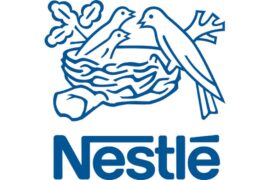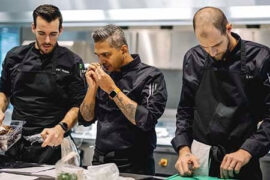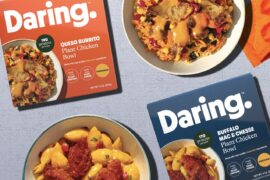Jamie Oliver, who has made a hugely successful career of zealously promoting “fresh, real food,” has chosen the frozen road less traveled as the route for his next big culinary project. The celebrity chef has reportedly signed an £11.5 million contract with Itajai, Santa Catarina, Brazil-headquartered BRF SA to lend his name, fame and expertise to a line of Sadia brand gourmet poultry-based frozen ready meals made with natural ingredients. The range is expected to be launched this September.
Announcement of the deal was met with criticism among some so-called “fresh food” purists as well as animal rights activists who have sparred with the world’s second largest poultry producer in Brazil. In their view, the “healthy home cooking champion” has sold out his principles by teaming up with a major processed foods manufacturer.
 But that’s not the way Oliver sees it. Responding to a drumbeat of negative publicity in the press and social media, he issued the following statement to The Daily Telegraph, a London-headquartered newspaper with international print and digital circulation:
But that’s not the way Oliver sees it. Responding to a drumbeat of negative publicity in the press and social media, he issued the following statement to The Daily Telegraph, a London-headquartered newspaper with international print and digital circulation:
“Everything I do has to have purpose in the food industry, and right at the heart of my partnership with Sadia is a massive system change of better chicken welfare standards at scale in Brazil.
“We’re revolutionizing the frozen food category with better quality food, and have already made a positive difference to the standards of over 40 million Brazilian chickens. And that’s just the start.”
For the record, Oliver is not entirely new to the frozen food business. His website, making no bones about the merits of sustainable frozen fish, proclaims:
“Introducing tasty ways to liven up everyday cooking, Jamie’s frozen fish range includes gorgeous fishcakes packed with lovely herbs, beautiful flaky fillets marinated in exciting flavors and crispy golden fish fingers. All the products are made with 100% fish fillets, lovely natural breadcrumbs and, to top it off, all the fish is responsibly sourced so there’s no compromise.”
Nutrition Education Pilot Project
Meanwhile, Sadia and the Jamie Oliver Food Foundation (JOFF) have joined forces to launch a nutrition education pilot project that will be implemented this year in Brazil’s public networks and private schools. The goal of the campaign is to create opportunities for students to become protagonists of healthy eating habits both at school and at home. The program, which will initially be tested with hundreds of pupils, is expected to reach out to more than 100,000 children over the next three years.
“The partnership is part of a larger project developed by Sadia to promote a significant change in the diet of Brazilians. We want food consumption in our country to become ever more balanced and enjoyable,” said Cecilia Mondino, Sadia’s marketing director. “The program adapted to the Brazilian reality is based on the ‘Kitchen Garden Project’ introduced by the British in UK schools. Teachers are taught through lectures and educational materials how to disseminate important food information in class and thus promote effective changes in feeding their students.”
The educational content includes practical recipes developed and adapted by Oliver in which the most accessible ingredients in Brazil – such as banana, apple, cassava and pineapple – are utilized.
“They are easy-to-prepare recipes, some of which do not require a stove,” said Mondino. “Thus, it is possible to encourage greater consumption of fruits and vegetables.”
Brazil’s Top Food Brand
 Sadia is the most valuable food brand in Brazil, according to a survey by consulting firm Millward Brown Vermeer, which estimated its worth at approximately $2 billion. The brand’s extensive product line runs the gamut from frozen ready meals and pizza to sausages and hamburger patties.
Sadia is the most valuable food brand in Brazil, according to a survey by consulting firm Millward Brown Vermeer, which estimated its worth at approximately $2 billion. The brand’s extensive product line runs the gamut from frozen ready meals and pizza to sausages and hamburger patties.
Perdigão, another BRF label, was valued at $416 million dollars. BRF, which has a market capitalization of almost $15 billion and ranks as Brazil’s largest processed food maker, has over 105,000 employees, 35 industrial units in Brazil, 13 plants abroad (six in Argentina, one in the United Kingdom, one in the Netherlands, four in Thailand and one in the United Arab Emirates) and 40 distribution centers. It exports products to over 120 countries.
According to a recent Bloomberg dispatch, the company is said to be considering selling stock in its Sadia Halal operation. It is estimated that initial public offering of the unit, which markets frozen food products in the Middle East and other regions, could generate $1.5 billion.
According to an article published by Bloomberg on July 22, BRF indicated in June that it would put Sadia into a separate subsidiary to supply food to Muslim markets, and that it was reviewing for the business.
Bloomberg reported: “BRF said in an e-mailed statement that while strategic alternatives are being analyzed to increase the unit’s expansion potential, it would be ‘premature to say that there is something of this nature going on.’ The company declined to comment on the potential value.”





